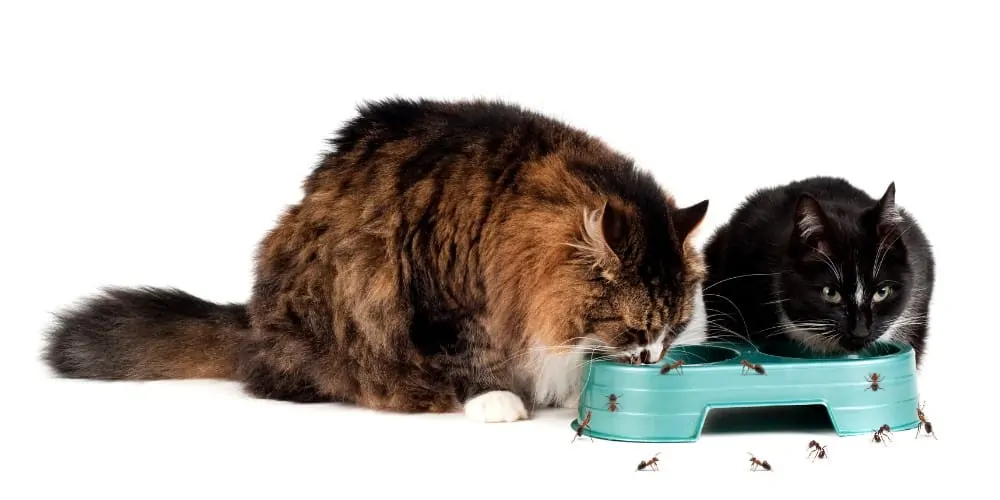Blackberries are a delicious and nutritious fruit that humans regularly enjoy, but can cats eat blackberries?
Cats can eat blackberries in moderation. Blackberries are non-toxic for cats and contain antioxidants, vitamins, and fiber that may benefit cats. However, blackberries also contain sugar, so only feed cats a few blackberries at a time, as too much sugar can be unhealthy.
Now that you know cats can enjoy these antioxidant-rich fruits, read on to learn the benefits and how much to feed safely. Your cat will be begging for these sweet summer treats!
Key Takeaways
- Cats can eat blackberries in moderation as they are non-toxic and contain antioxidants, vitamins, and fiber.
- Blackberries offer health benefits for cats, including antioxidants for immune support, fiber for digestion, and essential vitamins.
- Precautions include cutting blackberries into small pieces to prevent choking and limiting intake to avoid gastrointestinal upset.
- Some cats may be allergic to blackberries, so monitor for signs of allergies like vomiting and diarrhea.
- Washing and proper preparation of blackberries are essential to remove dirt and pesticides.
- Introduce blackberries gradually into your cat’s diet to allow their digestive system to adjust.
- Fresh blackberries are preferable, and adding sugar or other toppings should be avoided.
- Consult with a veterinarian before introducing new foods like blackberries to your cat’s diet.
- The article provides guidelines for feeding blackberries to kittens and addressing their sensitive digestive systems.
- Wild blackberries can be safe for cats if washed thoroughly and picked away from potentially contaminated areas.
Health Benefits of Blackberries for Cats
Blackberries contain a powerhouse of nutrients and antioxidants that offer a range of health benefits for cats:
Antioxidants for Immune Health
Blackberries contain impressive antioxidants, including anthocyanins, ellagic acid, gallic acid, salicylic acid, and vitamin C.
Antioxidants help neutralize free radicals and oxidative stress in the body that can damage cells.
The antioxidants in blackberries support your cat’s immune system health and ability to fight off diseases.
Fiber for Digestive Health
Blackberries can support your cat’s digestive system with around 5 grams of fiber per cup.
The fiber adds bulk to your cat’s stool and promotes regular bowel movements.
This makes blackberries a great snack for preventing or relieving constipation issues. The water content also helps keep your cat hydrated.
Vitamins A, C, K, and E for Overall Wellbeing
Blackberries provide a range of important vitamins including:
- Vitamin A for eye health, immune function, and shiny coats.
- Vitamin C for collagen production, immune health, and antioxidant effects.
- Vitamin K for healthy blood clotting and bone metabolism.
- Vitamin E for cell membrane protection and immune support.
These vitamins support several bodily processes and your cat’s overall wellness when consumed as a balanced diet.
Risks and Precautions
While blackberries offer valuable nutrition for cats, there are some precautions to take note of:
Choking Hazards
Blackberries’ small size and smooth texture poses a potential choking risk for cats.
Always cut blackberries into quarters or smaller pieces before serving. Avoid whole berries.
Overconsumption
Too many blackberries could lead to gastrointestinal upset like vomiting or diarrhea.
Limit your cat to 1-2 berries per day to assess tolerance. Gradually increase to 3-4 berries, 1-2 times weekly.
Allergies
Some cats may be allergic or intolerant to blackberries. Diarrhea and vomiting can signal an allergy. Discontinue feeding blackberries if these symptoms arise.
Pesticides
Wash store-bought blackberries to remove any pesticide residue. Better yet, grow your blackberries or buy organic to limit pesticide exposure.
When introducing blackberries, only give your cat a small taste to watch for adverse reactions. Increase slowly over a period of 2-3 weeks. This gives their digestive system time to adjust.
Preparing Blackberries for Cats
Follow these tips for preparing blackberries to feed your cat safely:
- Wash thoroughly under cool running water. This removes any dirt or pesticides.
- Pat dry with a paper towel or clean dishcloth.
- Remove the hull and any stems. Cats can choke on these fibrous parts.
- Chop the berries into quarters or smaller pieces. Cut any large berries into thin slices.
- Place the chopped berries in a shallow bowl. Mash slightly with a fork to release more juice.
- Always serve fresh blackberries within a day of purchasing or picking. Discard any moldy or spoiled berries.
- Avoid adding sugar, cream, or other toppings. Plain blackberries are the healthiest for cats.
- Refrigerate any leftover chopped berries in an airtight container for up to 2 days.
Proper preparation minimizes risks and enhances your cat’s nutrition from fresh blackberries.
How to Introduce Blackberries to Your Cat
When introducing any new food to your cat’s diet, take it slowly to allow their digestive system time to adjust:
- At first, only offer your cat a quarter of a blackberry once or twice a week.
- Mash the blackberry piece and mix it into your cat’s regular food. This masks the new flavor while still exposing your cat to the fruit.
- Gradually increase the amount of mashed blackberry over 2-3 weeks. Aim for 2-3 pieces mixed into each meal, 1-2 times weekly.
- If your cat is not interested initially, try rubbing a bit of juice on their lip to encourage licking and tasting the blackberry. The flavor may entice them.
- Monitor your cat for signs of an upset stomach like vomiting, diarrhea, or lack of appetite after eating the berries. Discontinue immediately if these occur.
- Only introduce one new food at a time. Wait 2-3 weeks before trying another fruit or veggie.
With patience and proper introduction, your cat can start reaping the benefits of blackberries.
Their digestive system will adjust better to the new food when introduced slowly.
Final Thoughts
Blackberries can be a healthy supplemental cat food when appropriately introduced and fed in moderation.
Their sweet flavor and abundance of nutrients offer benefits for your cat’s digestive health, immune system, skin and coat, and overall well-being.
Always monitor your cat for signs of an upset stomach when first trying blackberries.
Cut the berries into bite-sized pieces and limit to just a few per serving, 1-2 times weekly at most.
With some precautions, blackberries can be a tasty and nutritious treat for your feline friend!
Check with your veterinarian before introducing new foods like blackberries into your cat’s diet.
Frequently Asked Questions
Are blackberries safe for kittens?
Blackberries are safe for kittens in small amounts. Wait until 12 weeks to introduce tiny portions of mashed blackberry. Their digestive systems are quite sensitive.
Can blackberries help my cat lose weight?
The fiber and water content in blackberries can help create a feeling of fullness. But weight loss requires an overall reduced-calorie diet and exercise. Consult your vet for a weight loss plan.
How do I know if my cat is allergic to blackberries?
Signs of an allergy include vomiting, diarrhea, and skin irritation shortly after eating blackberries. Discontinue feeding them immediately if these symptoms occur.
Should blackberries be cooked before feeding cats?
Cooking blackberries reduces some nutrients, so raw is ideal. Light steaming is okay if your cat prefers softer foods. Avoid adding any sugar or spices.
Can cats eat blackberry jam?
Avoid feeding your cat any human food with added sugar, salt, or preservatives like jam. Stick to fresh or frozen blackberries.
Are wild blackberries safe for cats?
Wild blackberries are fine as long as you wash them thoroughly. Avoid picking berries close to roadsides that may be contaminated by car exhaust.
REFERENCES:
- Wikipedia. (2002, August 16). Blackberry. Retrieved from https://en.wikipedia.org/wiki/Blackberry
- Cornell University College of Veterinary Medicine. (2013, February 5). What pet food should I feed? Retrieved from https://www.vet.cornell.edu/news/20130205/what-pet-food-should-i-feed
- American Society for the Prevention of Cruelty to Animals (ASPCA). (2022, May 20). People Foods to Avoid Feeding Your Pets. Retrieved from https://www.aspca.org/pet-care/animal-poison-control/people-foods-avoid-feeding-your-pets
- The Vets. (2022, June 19). Should I Give My Cat Blackberries? Is It Safe? Retrieved from https://thevets.com/blog/can-cats-have-blackberries/


